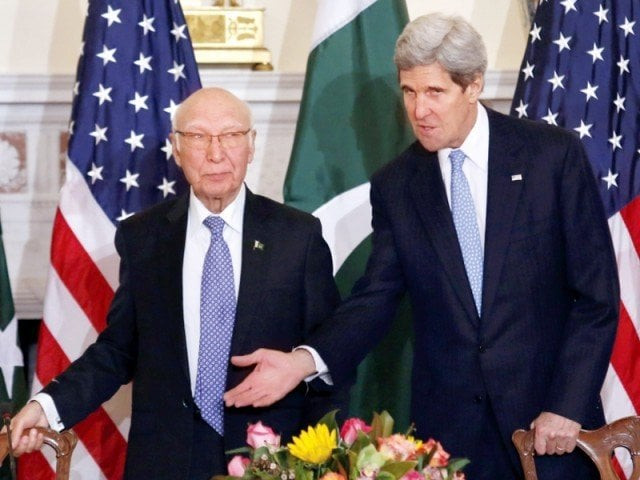The value of strategic dialogue
The government must have a clear set of goals as to exactly what it wants to get out of the dialogue.

While Kerry seemed to hint that Washington would be open to a conversation about free trade, Sartaj Aziz chose to focus his attention on past US mistakes and, of all things, the US relationship with India. PHOTO: REUTERS

Of course, reality is far more complex than US diplomatic protocol alone would indicate. Despite all the rhetoric to the contrary, the US leadership does primarily view Pakistan through the lens of security concerns. And prominent legislators in the US Congress have made it quite plain that they view the relationship as transactional, even if the Obama Administration is sincere in its declarations that it is looking for something more lasting. Nonetheless, the strategic dialogue does offer Pakistan a tremendous opportunity and the Nawaz Administration should seize it with all its might. The US remains the largest economy in the world and is Pakistan’s largest export destination after the European Union. The US is also, by far, the single largest source of foreign direct investment in Pakistan, accounting for over a quarter of all foreign money invested in the country over the past decade. Deepening economic ties with the US is very much in Pakistan’s interest, and made more possible by virtue of the strategic dialogue.
But if Pakistan is to achieve anything out of this exercise, the government must have a clear set of goals as to exactly what it wants to get out of the dialogue and it must assess what is realistically possible to get done, given the anti-Pakistan political climate in Washington. In our view, foremost on the government’s agenda should be a free trade agreement with the US. The Musharraf administration initially raised this possibility a few years ago, but then essentially forgot about it and none of its successors have seriously pursued the idea. Observers of US politics might argue that the idea died in the US legislature, but there may be a window of opportunity about to open up shortly.
Congress is currently debating whether or not to give the US president ‘fast track’ authority for a limited time to negotiate trade agreements with foreign countries. Essentially, it means that the legislature would vote simply yes or no on any trade treaties negotiated by the US president. The Nawaz Administration should gear up to take advantage of this narrow window of opportunity and have a treaty ready to go by the time President Barack Obama gets such authority. A free trade agreement with the US would be a seismic event for the Pakistani economy, boosting export revenues sharply and allowing the country to earn its way out of poverty. Combined with the recently granted GSP Plus status by the EU, such an agreement would make Pakistan a target for investment and firms seeking to capitalise on the opportunity to sell to those markets would set up or expand their presence in the country. But while US Secretary of State John Kerry seemed to hint that Washington would be open to a conversation about free trade, Sartaj Aziz, adviser to the prime minister on national security and foreign affairs, chose to focus his attention on past US mistakes and, of all things, the US relationship with India. Mr Aziz should know better. The strategic dialogue is an opportunity for Pakistan to put forth a positive agenda of its own, not just complain about what India is getting. The country simply cannot afford such petulance.
Published in The Express Tribune, January 30th, 2014.
Like Opinion & Editorial on Facebook, follow @ETOpEd on Twitter to receive all updates on all our daily pieces.















COMMENTS
Comments are moderated and generally will be posted if they are on-topic and not abusive.
For more information, please see our Comments FAQ